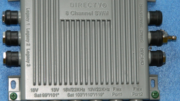Running a business is tougher than ever. You’re always looking for ways to cut costs while maintaining service levels. in some business, TV is a necessity while in others it’s just “nice to have.” We’ve shown you how DIRECTV can cost less than getting faster internet, but you might be thinking that cable TV is even cheaper than DIRECTV, especially if you already rely on the cable company for internet service. Here’s where you need to rethink your calculations: power costs.
You’ve got the power
Business owners often think that power costs are out of their control. After all you need computers, you need lights, and if you have a warehouse or factory floor, you need to run those heavy machines. You might have tried to put the lights on timers or encourage people to turn off computers that aren’t being used, but is that really enough? You need to control the energy that your devices are using.
Start with the facts. Energy costs are often the second highest part of your budget, right behind labor. This table shows it clearly. Yes it’s ten years old. But do we really think things have gotten better? Chances are they haven’t
Even ten years ago, you were paying between $10 and $60 per kilowatt-hour out there. You know that your energy bills can run into the thousands of dollars but maybe you think that’s just the cost of doing business. The truth is you have some control over how much you spend in energy costs, especially for entertainment.
How to control your energy costs
Maybe you can start with the TV. Look for televisions with the Energy Star logo on them. If you’re still rocking those old tube TVs out in the lunchroom it’s probably cheaper in the long run to replace them than keep them. Then take a long look at your TV provider. There’s only one provider out there who wins energy efficiency awards year after year: DIRECTV.
DIRECTV puts a lot of engineering effort into energy savings, from using green-power hard drives to external power supplies that don’t need expensive cooling fans. The latest generation of DIRECTV equipment costs pennies per day to operate while the same old cable company equipment costs dollars. In fact most cable company equipment uses more power than the equivalent products for home. Most cable companies are putting zero effort into energy efficiency for their commercial products.
In fact, most cable companies put almost no effort into their commercial products at all. They generally have some rack-mountable equipment that’s more robust than the receivers they put in homes, and they stop there. Especially since spinning off from AT&T in 2021, DIRECTV has focused more and more on business.
Look at it another way.
Fill your bar up with cable TV programming, using 8 cable HD receivers. Depending on where you are you could pay $1,500 per year just in power costs. Use DIRECTV receivers instead and your power cost could be as low as $300 per year. Suddenly that “double play” deal from the cable company doesn’t sound so good. Is it really saving you $1,200 per year?
The fact is that your customers, your employees… even you personally probably want DIRECTV programming but you’ve considered it an unnecessary luxury. All of a sudden, it seems a little more affordable, doesn’t it?
Oh and by the way, all that power savings probably does save the planet too. Might as well feel good about that.
Did I convince you?
If you’re ready to switch over to DIRECTV for Business, why not work with one of the country’s largest dealers? Signal Connect is here to help no matter where in the country you are? We have thousands of successful business installs. We’ve helped them succeed and we can help you too. Call us at 888-233-7563 and we’ll get started! If it’s after hours, fill out the form below and we’ll get back to you, usually within one business day.





